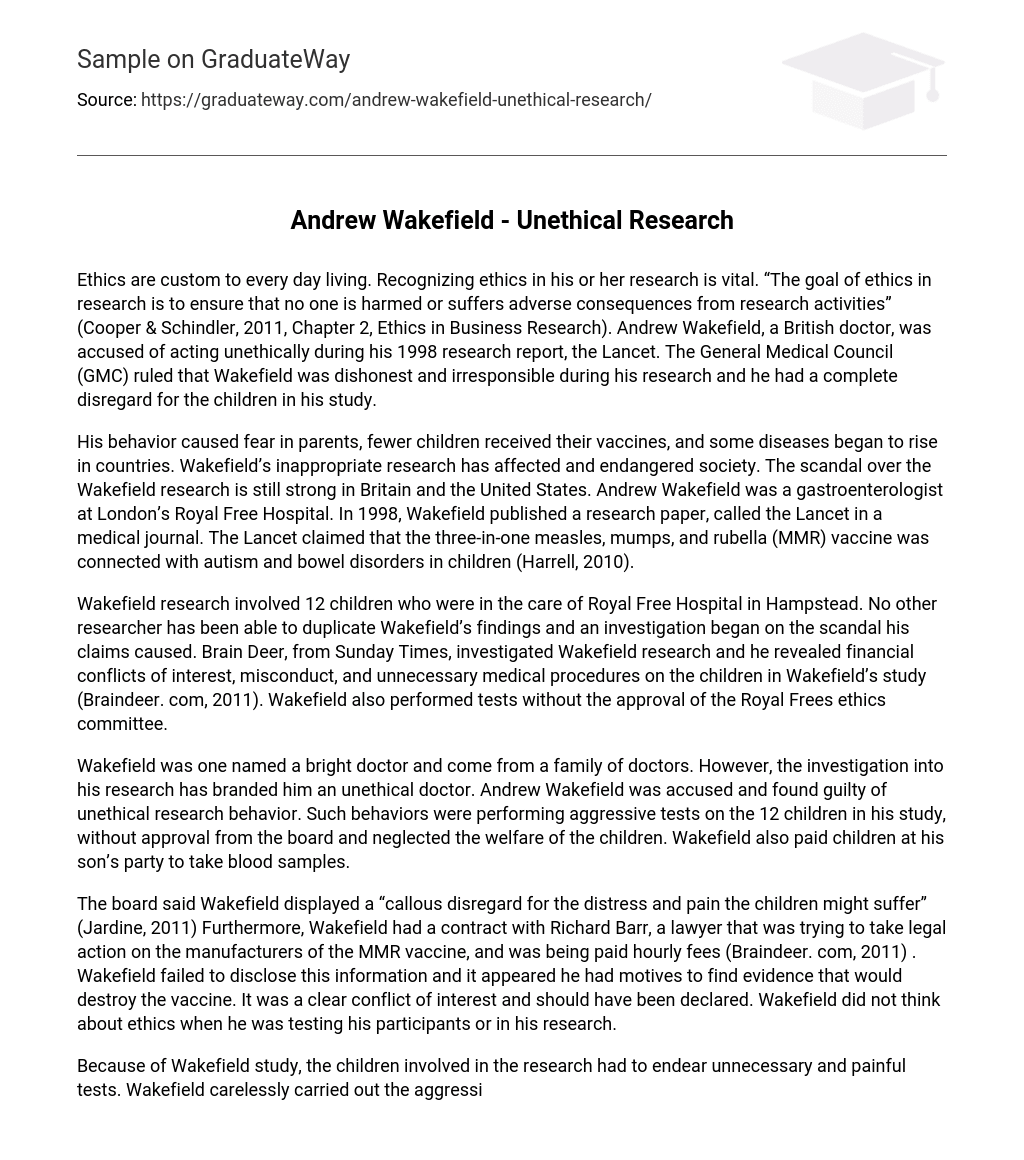Adhering to ethical standards is crucial in daily life, including during research. Cooper & Schindler (2011) state that the purpose of research ethics is to ensure that no harm or negative consequences are experienced by any individuals involved in the research activities (Chapter 2, Ethics in Business Research). In 1998, British doctor Andrew Wakefield faced accusations of unethical conduct in his research report titled the Lancet. Following an investigation, the General Medical Council (GMC) determined Wakefield’s guilt for dishonest and irresponsible behavior during his study, showing a complete disregard for the well-being of the participating children.
In 1998, an article published in the Lancet medical journal by Wakefield suggested a link between the MMR vaccine and autism as well as bowel disorders in children. Wakefield, a gastroenterologist at London’s Royal Free Hospital, caused concern among parents and resulted in decreased vaccination rates and increased incidence of certain diseases worldwide. The controversy surrounding Wakefield’s study continues to be significant both in Britain and the United States (Harrell, 2010).
Wakefield’s controversial research involved 12 children under the care of the Royal Free Hospital in Hampstead. However, no other researchers have been able to reproduce his results, prompting an inquiry into the scandal surrounding his claims. An investigation by Brian Deer from Sunday Times revealed financial conflicts of interest, misconduct, and unnecessary medical procedures performed on the children in Wakefield’s study (Braindeer.com, 2011). Furthermore, Wakefield conducted tests without obtaining ethical approval from the Royal Free Hospital’s ethics committee.
Wakefield, who hails from a family of doctors, was once regarded as a talented and brilliant medical professional. However, his research inquiry tarnished his reputation as an ethical doctor. Andrew Wakefield faced accusations and was ultimately convicted of engaging in unethical research practices. These practices included conducting invasive tests on the 12 children involved in his study without obtaining proper board approval and neglecting the wellbeing of the children. Additionally, Wakefield controversially compensated children at his son’s party to obtain blood samples.
The board accused Wakefield of showing a lack of concern for the potential suffering of the children (Jardine, 2011). Additionally, it was discovered that Wakefield had a contract with Richard Barr, a lawyer who was pursuing legal action against the manufacturers of the MMR vaccine and was receiving hourly payments (Braindeer.com, 2011). Wakefield neglected to disclose this information, suggesting that he had ulterior motives to obtain evidence that would discredit the vaccine. This conflict of interest should have been openly acknowledged. Wakefield did not consider the ethical implications when conducting his tests or in his research.
Due to Wakefield study, the children who participated in the research were subjected to unnecessary and painful tests. Wakefield conducted these aggressive tests on the children under his care without any consideration for their well-being or the potential effects it could have on them. Additionally, his study created widespread panic and insecurity surrounding the vaccine, leading parents of children with autism to feel guilty and blame themselves for their children’s illness. Wakefield’s unethical research has had a global impact, resulting in a decrease in vaccination rates in both Britain and the United States after the Lancet published his findings.
According to Braindeer.com (2011), vacations are still unaffordable and there has been an increase in measles cases in Britain. Wakefield’s unethical research led to the formation of an anti-vaccine society by his followers. The General Medical Council (GMC) in London declared Wakefield’s actions as unethical, labeled him as a dishonest and callous doctor, withdrew his paper published in the Lancet from scientific literature, and he resigned from Royal Free Hospital. The GMC also mandated for Wakefield to be removed from the UK doctors’ register (Braindeer.com, 2011). Ethical standards are crucial for researchers and society as they ensure that studies are safe and reasonable, preventing harm to participants and others involved in the research process. Andrew Wakefield, previously respected in the medical field, gained notoriety when he published a controversial study connecting MMR vaccine with autism and bowel disorders in children. However, his discredited research paper instilled fear among parents leading to a decrease in child vaccinations.
The Wakefield controversy led to both an investigation and a trial against Wakefield and his co-authors. The GMC determined that Wakefield’s research methods were unethical and irresponsible. Wakefield conducted a painful test on disabled children and illegally paid young children for blood samples without proper consent. As a result, Wakefield is now widely considered an unethical doctor. Although some supporters still defend his research, his credibility has been completely destroyed.
References
- Boseley, S. (2010, Jan). Andrew Wakefield found ‘irresponsible’ by GMC over MMR vaccine scare. Retrieved from http://www. guardian. co. k/society/2010/jan/28/andrew-wakefield-mmr-vaccine/print
- Braindeer. com. (2011). Exposed: Andrew Wakefield and the MMR-autism fraud. Retrieved from http://briandeer. com/mmr/lancet-summary. htm
- Harrell, E. (2010, Jan). Doctor in MMR-Autism Scare Ruled Unethical. Retrieved from http://www. time. com/time/printout/0,8816,1957656,00. html
- Jardine, C. (2011). GMC brands Dr Andrew Wakefield ‘dishonest, irresponsible and callous’. Retrieved from http://www. telegraph. co. uk/health/7095145/GMC-brands-Dr-Andrew-Wakefield-dishonest-irresponible-and-callous. html





